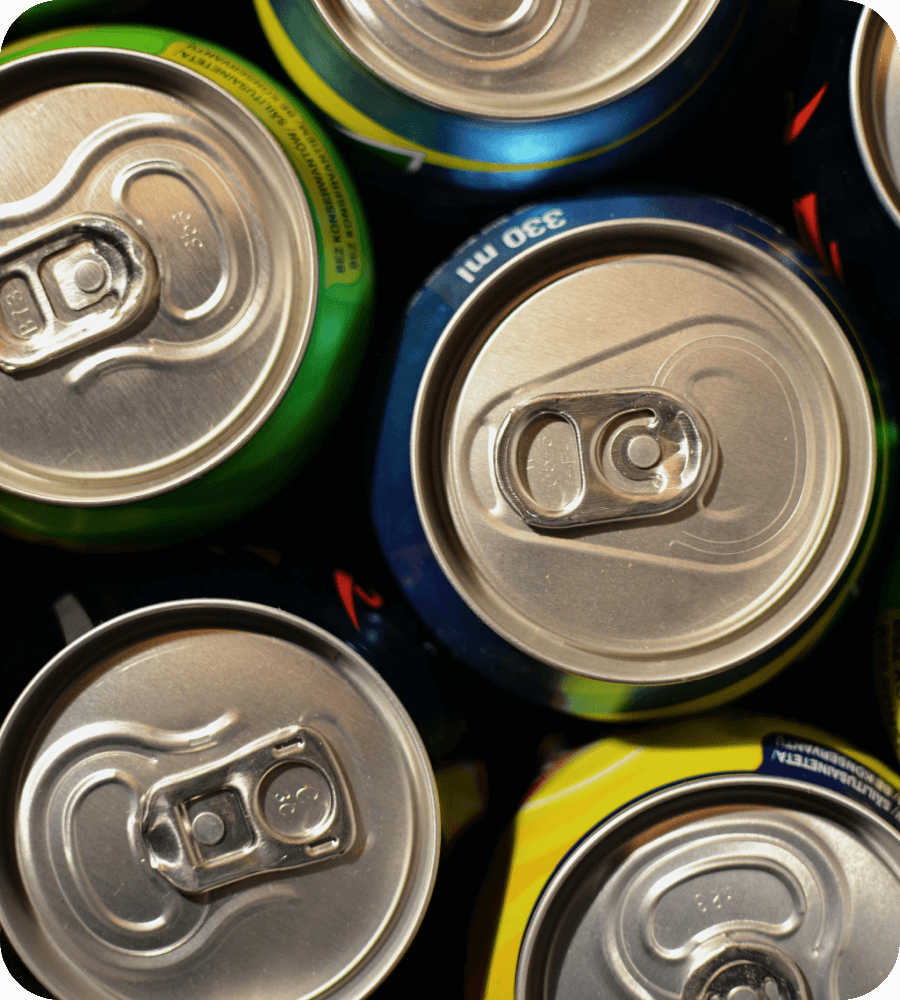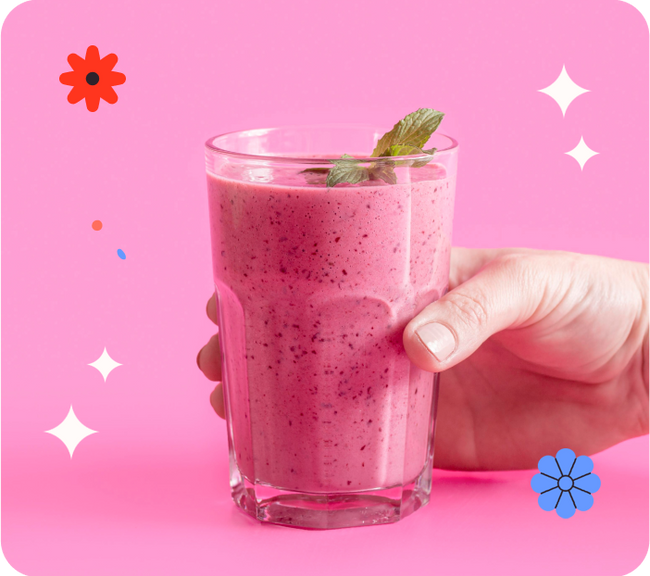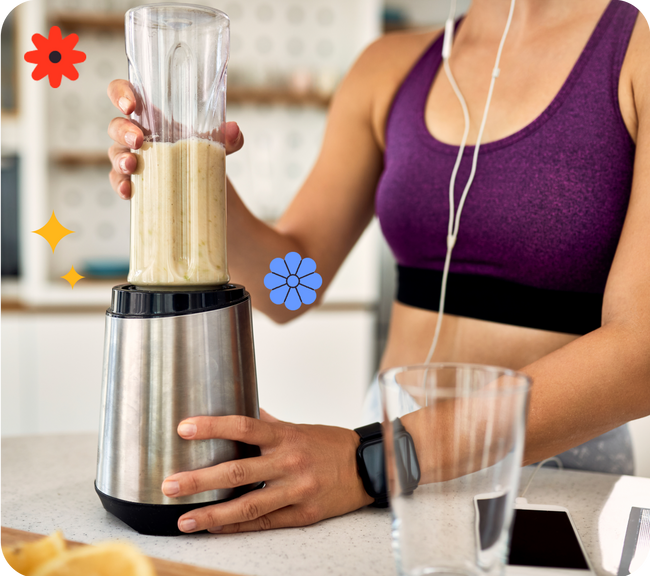Whether it’s battling the afternoon slump at work or pushing through those late-night sessions, most of us reach for a caffeine hit to ramp up our productivity. Do you prefer to sip on a warm, comforting cup of coffee, gently coaxing the sleepiness away or is it time to unleash the power of an energy drink to chase away the drowsiness?
What about those lazy days when summoning the motivation for a workout feels like climbing Mount Everest? Is it better to drink coffee or an energy drink?
Let's take a dive into the energy drinks vs coffee showdown and find out which one is your ultimate sidekick for boosting workouts, productivity, and creativity.
Coffee vs Energy Drinks
The caffeine content is not the only aspect to consider before reaching for a cup of coffee or an energy drink to stay awake. You should ideally consider different factors such as calories in the drink, their sugar content, nutrient profile, as well as, their impact on your weight and overall health.
Check out the table of differences given below for a quick reference. Then, we’ll explore each aspect to find out - is coffee better than energy drinks?
|
ASPECT |
COFFEE |
ENERGY DRINKS |
|---|---|---|
|
Caffeine Content |
Varies by type and size of coffee beans, brewing method, and serving size |
Generally high |
|
Nutrients |
Small amounts of vitamin B2, B5, manganese, and potassium as well as, antioxidants such as chlorogenic acid. |
Limited or negligible |
|
Calories |
Low |
Can be high |
|
Sugar |
Varies |
Can be high |
|
Impact on Weight |
Can aid in weight loss |
May contribute to weight gain |
|
Use Cases |
Energy boost for your daily routine. Improves alertness and focus while working or studying. |
Quick energy boost |
1. Caffeine Content
Cappelletti S, Piacentino D, Sani G, Aromatario M. Caffeine: cognitive and physical performance enhancer or psychoactive drug? Curr Neuropharmacol. 2015 Jan;13(1):71-88. doi: 10.2174/1570159X13666141210215655. Erratum in: Curr Neuropharmacol. 2015;13(4):554. Daria, Piacentino [corrected to Piacentino, Daria]. PMID: 26074744; PMCID: PMC4462044.
When comparing caffeine in coffee and energy drinks, the volume of your drink is the first point to consider. The caffeine content in energy drinks varies from 40-240mg.
The exact amount of caffeine in your coffee depends on the type and size of coffee beans used and how they were roasted. It also varies depending on how strongly the coffee is brewed. To find out what’s the right amount of caffeine for you, check out this awesome caffeine calculator.
The FDA recommendation for caffeine intake for healthy adults is capped at 400mg/day. On average, an 8-ounce cup of coffee offers you about 95 to 100 mg of caffeine. So you can safely have about 4 cups of coffee a day!Now, how many cups of coffee equal an energy drink?
The answer depends on the amount of caffeine in the energy drink. The more common 8-oz cans of energy drinks, found in convenience stores or gas stations, contain about 80 mg of caffeine. This means your average cup of joe offers you a more powerful caffeine kick than the canned stuff - unless you go for those super-sized cans with 12 to 16-oz.
When you are looking into how much caffeine is in coffee vs energy drinks, you should also think of how these drinks are consumed. When you slowly sip on a hot cup of coffee, the caffeine delivery is much slower in comparison to drinking it all at one go. Whether its a glass of cold coffee, a coffee shake or an energy drink, chugging them down with enthusiasm can result in a caffeine overload.
While energy drinks may give you the caffeine kick faster, you also tend to burn through it quickly and crash faster. With coffee, the effect kicks in slowly and lasts longer.
Winner of round 1: Coffee! You get adequate caffeine from coffee to perk you up. The caffeine effect is more steady and sustained in comparison to that of energy drinks.
2. Nutrients
When consumed in moderation, black coffee offers numerous health benefits. Coffee contains chlorogenic acid, a type of polyphenol with potent antioxidant properties. It helps neutralize free radicals in your body and reduce oxidative stress.
Coffee also has essential nutrients such as riboflavin (vitamin B2), pantothenic acid (vitamin B5), manganese, and potassium: These vitamins and minerals are involved in various metabolic processes and support bone health, heart health, and nerve functions.Church DD, Hirsch KR, Park S, Kim IY, Gwin JA, Pasiakos SM, Wolfe RR, Ferrando AA. Vitamins and minerals - Better Health Channel
Kolahdouzan M, Hamadeh MJ. The neuroprotective effects of caffeine in neurodegenerative diseases. CNS Neurosci Ther. 2017 Apr;23(4):272-290. doi: 10.1111/cns.12684. PMID: 28317317; PMCID: PMC6492672.
Energy drinks generally lack significant nutrients. You can enjoy additional health benefits if your drink contains other ingredients such as herbal extracts or amino acids.
Winner of round 2: Coffee again! You get some essential nutrients and antioxidants from coffee while the nutrient content in energy drinks is negligible.
3. Calories
While energy drinks tend to be high in calories, a cup of black coffee has zero calories.
While having four cups of coffee a day stays within the recommended amount of caffeine intake, your calorie intake may shoot up if you are not careful with what you add. Remember that adding milk and sugar will increase the calorie content of your coffee.
You can also sweeten your coffee with natural calorie-free sweeteners such as cane sugar or monk fruit. If you want to go dairy-free, you can add popular plant-based milks such as almond, soy, or coconut milk to your coffee.
Winner of round 3: Black coffee! Energy drinks tend to be high in calories. If you prefer a caffè latte, avoid excess sugar and go easy on the milk to keep your calories on the lower side.
4. Sugar Content
The sugar content of your coffee is in your hands. You can skip the sugar or add natural sweeteners as mentioned above. Unless you are on a strict weight loss diet, you can safely add a teaspoon of sugar to your coffee without worrying too much about it.
Energy drink (Red Bull) Nutritional Facts - nutritionvalue.org
Energy drink (Rockstar) Nutritional Facts - nutritionvalue.org
Ruiz-Ojeda FJ, Plaza-Díaz J, Sáez-Lara MJ, Gil A. Effects of Sweeteners on the Gut Microbiota: A Review of Experimental Studies and Clinical Trials. Adv Nutr. 2019 Jan 1;10(suppl_1):S31-S48. doi: 10.1093/advances/nmy037. Erratum in: Adv Nutr. 2020 Mar 1;11(2):468. PMID: 30721958; PMCID: PMC6363527.
Winner of round 4: Coffee! Add some sugar or skip it entirely - it’s in your hands. Energy drinks tend to be full of sugar or unhealthy artificial sweeteners.
5. For Weight Gain/Loss
Whether you’ll gain weight or lose weight with these drinks will depend on your calorie intake.
Acheson KJ, Gremaud G, Meirim I, Montigon F, Krebs Y, Fay LB, Gay LJ, Schneiter P, Schindler C, Tappy L. Metabolic effects of caffeine in humans: lipid oxidation or futile cycling? Am J Clin Nutr. 2004 Jan;79(1):40-6. doi: 10.1093/ajcn/79.1.40. PMID: 14684395.
Dulloo AG, Geissler CA, Horton T, Collins A, Miller DS. Normal caffeine consumption: influence on thermogenesis and daily energy expenditure in lean and postobese human volunteers. Am J Clin Nutr. 1989 Jan;49(1):44-50. doi: 10.1093/ajcn/49.1.44. PMID: 2912010.
Anderson DE, Hickey MS. Effects of caffeine on the metabolic and catecholamine responses to exercise in 5 and 28 degrees C. Med Sci Sports Exerc. 1994 Apr;26(4):453-8. PMID: 8201901.
Ammon HP. Biochemical mechanism of caffeine tolerance. Arch Pharm (Weinheim). 1991 May;324(5):261-7. doi: 10.1002/ardp.19913240502. PMID: 1888264.
With their high-calorie content, energy drinks tend to cause weight gain rather than weight loss.
Winner of round 5: Coffee! It promotes weight loss by increasing your metabolism and mobilizing stored body fat. Consuming too many energy drinks can lead to weight gain due to their high-calorie content.
6. Use Cases: Staying Awake, Productivity, Exercise
Caffeine chases away your drowsiness by blocking adenosine, an inhibitory neurotransmitter. This, in turn, leads to the release of neurotransmitters such as dopamine and norepinephrine, making you feel awake and energized.
Compared to energy drinks, coffee has more than just caffeine to keep you awake. It contains other stimulants that affect metabolism, such as theobromine, theophylline, and chlorogenic acid. Coffee is a must-have in my morning routine. I prefer sipping on a warm cup of coffee to wake me up whenever I feel drowsy. On a hot day, there is nothing better than a chilled glass of cold coffee.
Now, how about ‘coffee vs energy drinks for studying’?
Increased productivity: The increase in adrenaline and dopamine helps you stay alert and focused on your tasks, whether it be office work or studies.
Doherty M, Smith PM. Effects of caffeine ingestion on exercise testing: a meta-analysis. Int J Sport Nutr Exerc Metab. 2004 Dec;14(6):626-46. doi: 10.1123/ijsnem.14.6.626. PMID: 15657469.
Doherty, M. and Smith, P.M. (2005), Effects of caffeine ingestion on rating of perceived exertion during and after exercise: a meta-analysis. Scandinavian Journal of Medicine & Science in Sports, 15: 69-78. https://doi.org/10.1111/j.1600-0838.2005.00445.x
This changes how you perceive fatigue - you feel less tired and more able to push through your workouts. You can even add some protein powder to make the ultimate preworkout drink - protein coffee.
Winner of round 6: Hot or cold, it's still coffee for me! The caffeine in coffee and energy drinks blocks adenosine and increases dopamine and norepinephrine release, helping you feel energized, awake, and ready for action.
Is Coffee Healthier than Energy Drinks?


There is no doubt that coffee is healthier than commercial energy drinks. Unlike energy drinks with high caffeine content, the moderate caffeine content in coffee enhances your focus, alertness, and cognitive functions without excessive stimulation.
Beyond its caffeine benefits, coffee has some essential nutrients and antioxidants such as chlorogenic acid. Energy drinks are generally lacking in essential nutrients. Coffee is also relatively lower in calories, especially since you can control how much sugar or cream you add.
Energy drinks may contain other additives such as artificial flavors or herbal extracts with undesirable side effects. While coffee is indeed a healthier choice, the key is moderation - you should limit your daily coffee intake to a maximum of 3 to 4 cups a day.
Are Sugar-Free Energy Drinks Better?
Sugar-free energy drinks can be advantageous if you're trying to reduce your overall caloric intake and manage your weight. They also help diabetics maintain stable energy levels and avoid rapid spikes and crashes in their blood sugar levels. Compared to high-sugar drinks, sugar-free energy drinks are less likely to contribute to tooth decay and cavities.
However, many sugar-free energy drinks use artificial sweeteners such as aspartame, sucralose, and saccharin. These can upset your gut bacteria balance and lead to a host of other health complications.
Although sugar-free, these energy drinks may contain too much caffeine and lack essential nutrients. Also, the taste of sugar-free energy drinks is different from natural sugars and tends to be less satisfying.


Conclusion 
So, are energy drinks worse than coffee? In other words - is coffee better for you than energy drinks? In our showdown of energy drinks vs coffee, it's the coffee that emerged as the clear winner in all six rounds.
When it comes to taste, there is nothing to beat the intricate flavors and delightful aroma of coffee. Coffee's balanced dose of caffeine offers a reliable boost, gently awakening your senses. Coffee also offers your heart healthy antioxidants and other essential nutrients. Whether it's a revitalizing cup of espresso or a comforting latte, make your caffeine choice wisely and practice moderation.
 References
References 
- Cappelletti S, Piacentino D, Sani G, Aromatario M. Caffeine: cognitive and physical performance enhancer or psychoactive drug? Curr Neuropharmacol. 2015 Jan;13(1):71-88. doi: 10.2174/1570159X13666141210215655. Erratum in: Curr Neuropharmacol. 2015;13(4):554. Daria, Piacentino [corrected to Piacentino, Daria]. PMID: 26074744; PMCID: PMC4462044.
- What are proteins and what do they do? - US FDA
- Church DD, Hirsch KR, Park S, Kim IY, Gwin JA, Pasiakos SM, Wolfe RR, Ferrando AA. Vitamins and minerals - Better Health Channel
- Kolahdouzan M, Hamadeh MJ. The neuroprotective effects of caffeine in neurodegenerative diseases. CNS Neurosci Ther. 2017 Apr;23(4):272-290. doi: 10.1111/cns.12684. PMID: 28317317; PMCID: PMC6492672.
- Energy drink (Red Bull) Nutritional Facts - nutritionvalue.org
- Energy drink (Rockstar) Nutritional Facts - nutritionvalue.org
- Ruiz-Ojeda FJ, Plaza-Díaz J, Sáez-Lara MJ, Gil A. Effects of Sweeteners on the Gut Microbiota: A Review of Experimental Studies and Clinical Trials. Adv Nutr. 2019 Jan 1;10(suppl_1):S31-S48. doi: 10.1093/advances/nmy037. Erratum in: Adv Nutr. 2020 Mar 1;11(2):468. PMID: 30721958; PMCID: PMC6363527.
- Acheson KJ, Gremaud G, Meirim I, Montigon F, Krebs Y, Fay LB, Gay LJ, Schneiter P, Schindler C, Tappy L. Metabolic effects of caffeine in humans: lipid oxidation or futile cycling? Am J Clin Nutr. 2004 Jan;79(1):40-6. doi: 10.1093/ajcn/79.1.40. PMID: 14684395.
- Dulloo AG, Geissler CA, Horton T, Collins A, Miller DS. Normal caffeine consumption: influence on thermogenesis and daily energy expenditure in lean and postobese human volunteers. Am J Clin Nutr. 1989 Jan;49(1):44-50. doi: 10.1093/ajcn/49.1.44. PMID: 2912010.
- Anderson DE, Hickey MS. Effects of caffeine on the metabolic and catecholamine responses to exercise in 5 and 28 degrees C. Med Sci Sports Exerc. 1994 Apr;26(4):453-8. PMID: 8201901.
- Ammon HP. Biochemical mechanism of caffeine tolerance. Arch Pharm (Weinheim). 1991 May;324(5):261-7. doi: 10.1002/ardp.19913240502. PMID: 1888264.
- Doherty M, Smith PM. Effects of caffeine ingestion on exercise testing: a meta-analysis. Int J Sport Nutr Exerc Metab. 2004 Dec;14(6):626-46. doi: 10.1123/ijsnem.14.6.626. PMID: 15657469.
- Doherty, M. and Smith, P.M. (2005), Effects of caffeine ingestion on rating of perceived exertion during and after exercise: a meta-analysis. Scandinavian Journal of Medicine & Science in Sports, 15: 69-78. https://doi.org/10.1111/j.1600-0838.2005.00445.x
































